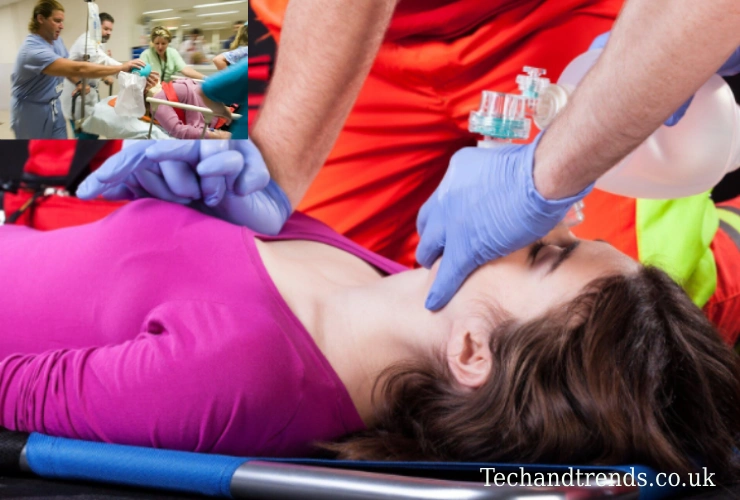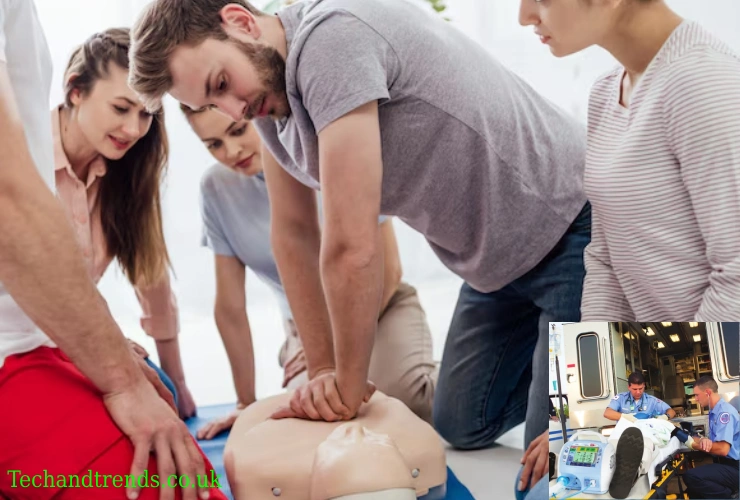What Are Essential Health Emergency Certifications?
Essential Health Emergency Certifications are official qualifications that prove a professional has the skills and knowledge to respond effectively to health emergencies. These certifications cover a wide range of emergency situations, including heart attacks, strokes, trauma, natural disasters, and infectious disease outbreaks. They are designed to prepare healthcare workers, emergency responders, and other professionals to act quickly and confidently in critical moments.
These certifications are not just for doctors and nurses. Many other professionals in healthcare, public safety, and emergency management also benefit from having these credentials. They ensure that individuals can provide proper care, reduce risks, and save lives during emergencies.
Why Are Essential Health Emergency Certifications Important?
Health emergencies can happen anytime and anywhere. Being prepared with the right training and certification is crucial for several reasons:
- Life-Saving Skills: These certifications teach you how to perform life-saving procedures like CPR (cardiopulmonary resuscitation), use an AED (automated external defibrillator), and manage trauma.
- Career Advancement: Many healthcare jobs require these certifications. Having them can open doors to better job opportunities and promotions.
- Legal Compliance: Some certifications are required by law or workplace policies to ensure safety and quality care.
- Confidence in Emergencies: Knowing what to do in a crisis reduces panic and improves outcomes.
- Professional Credibility: Certified professionals are trusted more by employers, colleagues, and patients.
Read more about : How to Prevent Cavities:
Who Should Get Health Emergency Certifications?
Essential Health Emergency Certifications are valuable for a wide range of professionals, including:
- Healthcare Providers: Doctors, nurses, paramedics, and medical assistants.
- Emergency Responders: EMTs (Emergency Medical Technicians), firefighters, police officers, and first responders.
- Hospital and Clinic Staff: Administrators, support staff, and emergency coordinators.
- Public Health Workers: Those involved in disease control, disaster response, and community health.
- Caregivers and Teachers: Anyone responsible for the safety of others in schools, daycare centers, or nursing homes.
- General Public: People who want to be prepared to help family, friends, or strangers in emergencies.
Types of Essential Health Emergency Certifications
There are many health emergency certifications available, but some are considered essential due to their widespread recognition and importance. Below are the most common and valuable certifications:
Basic Life Support (BLS)
BLS is a foundational certification that teaches CPR, how to use an AED, and basic airway management. It is designed for healthcare professionals and others who need to know how to respond to cardiac and respiratory emergencies.
- Who should get BLS? Nurses, doctors, paramedics, and even non-medical staff in healthcare settings.
- Course length: Usually 4-6 hours.
- Renewal: Every 2 years.
Advanced Cardiovascular Life Support (ACLS)
ACLS builds on BLS skills and focuses on advanced emergency care for adults experiencing cardiac arrest or other heart-related emergencies. It includes managing arrhythmias, using advanced airway devices, and administering emergency medications.
- Who should get ACLS? Physicians, nurses, paramedics, and other advanced healthcare providers.
- Course length: 2 days (16 hours).
- Renewal: Every 2 years.
Pediatric Advanced Life Support (PALS)
PALS is similar to ACLS but focuses on emergency care for infants and children. It covers pediatric cardiac arrest, respiratory emergencies, and shock management.
- Who should get PALS? Pediatricians, nurses, emergency medical providers working with children.
- Course length: 2 days.
- Renewal: Every 2 years.
Certified First Responder (CFR)
CFR certification teaches basic emergency medical care and first aid. It is often the first step for those entering emergency services.
- Who should get CFR? Firefighters, police officers, security personnel, and volunteers.
- Course length: 40-60 hours.
- Renewal: Every 2 years.
Emergency Medical Technician (EMT)
EMT certification is a more advanced level of emergency medical training. EMTs provide pre-hospital care, including patient assessment, airway management, and trauma care.
- Who should get EMT? Those pursuing careers as paramedics or ambulance personnel.
- Course length: 120-150 hours.
- Renewal: Every 2-3 years.
Healthcare Emergency Manager (HcEM)
The HcEM certification is designed for healthcare professionals who manage emergency preparedness and response in healthcare settings. It has three levels:
- Basic: Entry-level knowledge.
- Professional: Mid-career with experience.
- Mastery: Senior leaders with extensive experience.
Certified Healthcare Emergency Professional (CHEP)
CHEP certification focuses on healthcare emergency management, including disaster preparedness, response planning, and recovery strategies.
- Who should get CHEP? Healthcare emergency managers, hospital administrators, and public health officials.
- Requirements: Experience in healthcare emergency management and passing an exam.
Basic Emergency Care (BEC)
Developed by the World Health Organization (WHO), BEC is designed for healthcare providers in low-resource settings. It teaches essential emergency care skills for trauma, respiratory distress, and shock.
- Who should get BEC? Healthcare workers in developing countries or resource-limited areas.
- Course length: 4 days.
How to Choose the Right Certification for You
Choosing the right certification depends on your career goals, current job, and experience level. Here are some tips to help you decide:
- Assess Your Role: If you work directly with patients, BLS and ACLS may be essential. If you manage emergency plans, consider HcEM or CHEP.
- Check Job Requirements: Look at job listings or speak to your employer to find out which certifications are needed.
- Consider Your Experience: Some certifications require prior experience or other certifications.
- Think About Your Career Path: Certifications can help you move into specialized or leadership roles.
- Look for Accredited Programs: Ensure the certification is recognized by reputable organizations like the American Heart Association or the National Registry of Emergency Medical Technicians.
How to Get Certified: Step-by-Step Guide
Getting certified usually involves several steps:
1. Find an Accredited Course
Look for courses offered by recognized organizations. Many hospitals, colleges, and training centers offer these programs. Online courses are also available for some certifications.
2. Complete the Training
Attend all required classes or online modules. Training includes lectures, demonstrations, and hands-on practice.
3. Pass the Exams
Most certifications require passing both a written test and a practical skills test. These exams ensure you understand the material and can perform the skills correctly.
4. Receive Your Certification
After passing, you will receive a certificate valid for a specific period (usually 2 years).
5. Maintain Your Certification
Stay current by renewing your certification before it expires. This often involves taking refresher courses and passing renewal exams.
Benefits of Having Health Emergency Certifications
Improved Patient Outcomes
Certified professionals can provide faster and more effective care, which increases the chances of survival and recovery.
Increased Job Opportunities
Many healthcare and emergency jobs require certifications. Having them gives you a competitive edge.
Higher Salary Potential
Certified professionals often earn higher wages due to their specialized skills.
Enhanced Professional Reputation
Certification signals commitment and expertise to employers and colleagues.
Personal Confidence and Preparedness
Knowing how to respond in emergencies reduces stress and increases your ability to help others.
Common Myths About Health Emergency Certifications
Myth 1: Only Medical Professionals Need These Certifications
Fact: While healthcare providers commonly need these certifications, many non-medical professionals benefit from them, including teachers, security personnel, and community volunteers.
Myth 2: Certifications Are Too Expensive and Time-Consuming
Fact: Many affordable options exist, and the time invested is minimal compared to the life-saving skills you gain.
Myth 3: Once Certified, You Don’t Need to Renew
Fact: Emergency care guidelines change often. Renewals ensure your knowledge stays current.
Where to Find Health Emergency Certification Courses
- American Heart Association (AHA): Offers BLS, ACLS, PALS, and more.
- National Registry of Emergency Medical Technicians (NREMT): EMT and paramedic certifications.
- International Association of Emergency Managers (IAEM): For emergency management certifications.
- World Health Organization (WHO): Basic Emergency Care and other global health courses.
- Local Hospitals and Colleges: Many offer in-person and online courses.
- Online Platforms: Some certifications offer blended or fully online options.
How to Prepare for Health Emergency Certification Exams
- Study the Course Materials: Review all manuals and videos provided.
- Practice Skills Regularly: Hands-on practice is critical for success.
- Join Study Groups: Learning with peers helps reinforce knowledge.
- Use Practice Tests: Many organizations provide sample exams.
- Stay Calm and Focused: On exam day, take your time and follow instructions carefully.
Real-Life Examples of How Certifications Save Lives
- A nurse with BLS and ACLS skills revived a patient who suffered cardiac arrest in a hospital hallway.
- A teacher trained in first aid and CPR saved a child who was choking during recess.
- An EMT used trauma care skills to stabilize a car accident victim before reaching the hospital.
- A healthcare emergency manager coordinated an effective response during a community-wide flu outbreak, minimizing illness and death.
Conclusion:
Essential Health Emergency Certifications are more than just credentials-they are tools that empower you to save lives and improve health outcomes. Whether you are a healthcare worker, emergency responder, or concerned citizen, getting certified prepares you to act confidently and effectively during health emergencies.
Start by choosing the certification that fits your needs and career goals. Enroll in a course, complete your training, and earn your certification. Remember to keep your skills fresh with regular renewals and practice. Your knowledge and readiness can make a difference when every second counts.


Comments are closed.